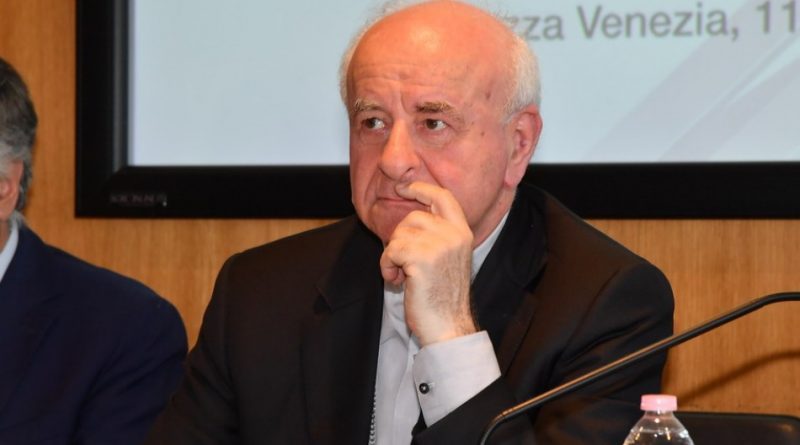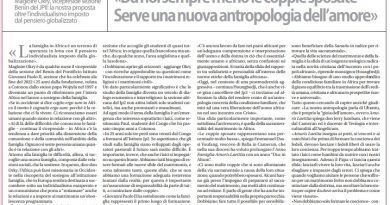“We must fight against this epidemic of loneliness.”
Family and Coronavirus – An interview with Archbishop Vincenzo Paglia
by Arnaldo Casali
The great danger is that the Covid-19 virus will damage not only our lungs but also our hearts, that we will become infected with the idea that being alone is good for us, that the only way to stay healthy is to shut ourselves off and keep others at a distance.
“No, there is one aspect of the virus that is not mitigated by the increased isolation that these days might call for.” explains Archbishop Vincenzo Paglia, Grand Chancellor of the John Paul II Theological Institute for Marriage and Family Sciences, “Now is a time that asks us to look for meaning. But really, it only seems that meaning is lacking; and we can call these days a time of “empty streets but full lives.”
Statistics show that with the lockdown robberies and burglaries in homes have fallen off, but domestic violence has increased.
“The data reveal, unfortunately, that separations and divorces spike after summer and Christmas holidays. Too often, life together leads to arguments; conversations, instead of becoming an opportunity for growth and clarification, end up becoming sparks that kindle repressed conflicts, recriminations and, all too often, violence toward the defenseless, toward women”.
Even so, having to live isolated could become an opportunity to deal with problems and try to resolve them.
“The family is not born to be alone, closed up in a house: these times of pandemic are neither normal nor desirable. We are social animals: in the early days of the human species there developed a real push to be with others, to encounter them, to get close to them. Loneliness and isolation are not made for us and can even cause a weakening of the immune system. These days, the other, the friend, the colleague are fading from our consciousness, but our family members are with us to remind us that we are creatures made for sociability and relationships. Adults, especially, are called on to make an extra effort, to realize that there are people close to them, that they too are unprepared, have sorry thoughts about the future, do not know what to do, do not know why this is happening. We need to identify more with others, to understand them and, if possible, show a little more imagination and creativity, which are part of love but which perhaps we had forgotten. This is the right time to rediscover the strength of relationships. Let us begin, even now, to build the future that awaits us.”
David Grossman says that once the emergency is over there will be many more divorces. Do you think it’s possible instead that this quarantine can save marriages, that, deprived of distractions and getaways, men and women will rediscover the beauty of togetherness with their wives, their husbands, their children?
“These days are up to us: our family relationships can benefit from them, or they might end up more tense, more difficult. Pope Francis, in Amoris Laetitia suggests that we learn to love each other by studying one of the clearest and most profound descriptions of love—the “Hymn of Love” in St. Paul (1 Cor. 12:31-13:13). He asks us to compare our relationships with the love described by the Apostle: ‘Love is not pompous, it is not jealous, it is not quick-tempered, it is not rude, it does not seek its own interest, it does not brood over injury…’ These days, when streets are empty and houses crowded, are an opportunity to learn, but it is up to all of us to take advantage of them. We are closer to wives, husbands, children, but with this we see defects even more clearly, and sparks are more likely to fly if the air is compressed. We must be careful and try to see in those who are in this with us that talent, that value and the why they are right here, right next to us, right now in this mysterious time.”
Saint Paul also wrote: “See who can show the most honor, one to another” (Rom. 12:10)
“It seems to me an ideal program for life today. Usually we compete in looking for each other’s faults, and we show impatience and irritability. We should be able to rediscover a sense of calm, admiration and gratitude for each other. Gregory the Great, the Pope who, at the end of the sixth century, prayed for the end of a plague in Rome, wrote: “An impatient person cannot do good if in daily life he or she cannot calmly put up with the faults of others.”
In Germany the Corona virus has a much lower mortality rate than in Italy. One of the hypotheses to explain this difference is that German elderly people are more alone than Italian ones and have not been infected by children and grandchildren. One might almost ask: is it better to live alone or die in the company of loved ones?
“This could indeed explain the statistics in Germany. When the epidemic broke out, such greater isolation was useful. But does the virus want to teach us to stay far away from each other, to stay separate? We cannot and will not accept that. I am thinking of the grace enjoyed by those elderly couples who during these days can still appreciate the gift that is their husbands or wives. But I’m also thinking how worry and anxiety can grip those who are advanced in years but are alone, with their children and grandchildren far away.”
Add to that our awareness, which is spreading, that when the world reopens, the elderly might be asked to make an additional sacrifice, to be further shut in and isolated.
“The virus is not fought with increased solitary living, as it now might seem. It is fought with science, with the ability of the cultural and scientific world to create systems, to work together and find vaccines, to prevent contagion. For now, we can and must distance ourselves and save ourselves from the virus, but a pandemic of loneliness will not save the world. Everyone knows how in our large cities the number of so-called singles is growing; some even call them “single-person families.” The last few decades have seen growing numbers of people who choose to live alone, or who end up living alone even if they don’t want to. Mattia Ferraresi, in his latest book Solitudine, describes this troubling situation as a real “epidemic” and speaks of “a radical absence of connections, an emptiness that frays the threads of life and sometimes leads consciousness and the mind toward the darkest recesses of human experience.” I myself have written a book about the “collapse of the ‘us’” and to the disappearance of bonds that are strong and meaningful. These times we are living through can cause us to rediscover the beauty of our responsibility to create relationships that are strong and lasting, but doing so requires commitment, tenacity and perseverance.”

In addition, we can’t forget that many local outbreaks have begun in elder care facilities.
“Elder care facilities are particularly close to my heart, thanks to the more than fifty years of work in this sector by the Community of St. Egidio. To call them “retirement communities” would be misleading because living there is far from relaxed and is often difficult and burdensome. It is true that they reveal a need, a reality and a demand that exists in our families that we must recognize and respond to. We have ensured a long life for everyone, but we don’t know how to make old age rewarding. In these days, Italy is “discovering” elder care facilities, but the fact that it is happening only now reveals short-sightedness and unfairness. The situation is well-known, however, to the residents and their families, to the staffs who work there, and to the few volunteers who help out. We have seen that the contagion spread rapidly in these institutions, but I don’t believe that was due only to serious failings closely linked to the current situation. The elder care system itself needs to be completely rethought, with a view to its gradual disappearance. Even before the pandemic, the situation was not good. Just as we are anxiously waiting for the contagion curve to flatten, we should work to ensure that these places no longer exist, and that the elderly continue to live in their own homes as much as possible.”
How can we get past the idea of “old folks’ homes”?
“We will have to work to enhance the attractiveness of common life for the elderly, shared residences and small independent houses for example, just as we will have to increase support for families so that they can afford to keep grandparents and aging parents at home. Before the virus, we had become convinced that in arranging our daily life, it had sometimes become impossible to do otherwise than find a retirement home for our elders. Today we can’t take anything for granted: life is in our hands and rethinking a new and different future is something we can do as humans, especially after crises and catastrophes. The extra and slowed-down time we have these days makes us realize once again that we have to make choices and plans. Pope Francis has often criticized a sad “throwaway culture” affecting the elderly. Those who have devoted their lives to giving us life, an education and a future deserve, in their old age, to be cared for in their own homes or in a family environment rich with care and attention. It is the least we can learn from the commandment to “honor thy father and thy mother.” I hope that the debate begun in these days about facilities for the elderly will go far beyond the current emergency and help us look together for other, more effective ways to address the question.”
This virus has taken from us all our ways of showing affection, even preventing us from hugging and shaking hands. Do you think that this forced “abstinence” will lead us to value certain gestures more highly?
“We can’t hug or shake hands, it’s true. However, as the Dean of the John Paul II Institute, Monsignor Pierangelo Sequeri reminds us, “the language of the eyes becomes more intense,” since the mask doesn’t cover the eyes. We will get back to shaking hands, to using body language and perhaps to choosing more carefully when we hug someone to express our empathy and closeness. One criterion could be the strength and sincerity of a relationship. We could avoid the more superficial manifestations of merely social closeness, and perhaps learn new forms of greeting from other cultures.”
The basic question is: will everything go back to the way it was before?
“From a social, geopolitical and economic point of view I don’t think so. Another era will begin. But I believe that the coming Easter brings us a message of hope: when the Risen One returned and appeared after His death, was everything as it was before the Passion and Resurrection? The Risen Jesus said he would meet his brothers in Galilee (Mt. 28:10), that is, where everything started, where he lived before his mission began. Yet now, history had changed, the God made man had overcome evil and death. A new beginning starts in Galilee. We begin again from Galilee, from where we lived before, but nothing is any longer the same as it was. The Christian message of Easter fills us with hope and courage. As Pope Francis said in his message to the Italians a few days ago, “‘We have hope, which is not an illusion and therefore does not disappoint, that a better time is coming, and we will be the first to be better.’”
“Dobbiamo combattere l’epidemia della solitudine”
VERSIONE ITALIANA





